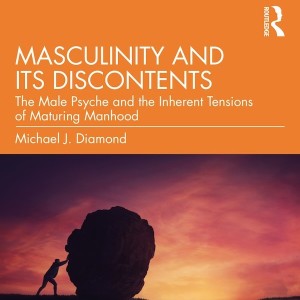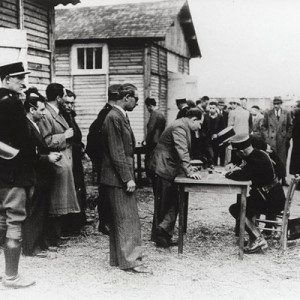Talks On Psychoanalysis
Oedipus Complex
Episodes

Thursday Dec 14, 2023
Thursday Dec 14, 2023
The place of sexuality in psychoanalytic treatment and training today: Can we observe a disappearance of sexuality in case reports and supervisions?
How does the evolving discourse on sexuality influence psychoanalytic practice and training? In an era where sexual dysphoria is seemingly on the rise, particularly among younger generations, questions arise about the current positioning of Freud's drive theory and the status of sexual issues in psychoanalytic education. Are we witnessing a shift where sexuality loses its central place within psychoanalytic thought?
In this episode of the IPA Talks On Psychoanalysis podcast series, we explore these questions through a comprehensive discussion. The focus is on the potential diminution of sexual themes in psychoanalytic case reports, as observed in recent years, and its implications for psychoanalytic methodology. The discourse originated in the 2021 supervisors' and training analysts' conference of the German Psychoanalytical Association (DPV) in Cologne, Germany and quickly spread to other places, reflecting global concerns about the reduced emphasis on sexuality in candidates' reports for qualification.
This exploration revisits some cornerstones of Freud's seminal theories but also examines the more modern theories and psychoanalytic techniques that emphasize transference-countertransference dynamics for the understanding of sexual fantasies and identities. The role of societal changes, shifts in sexual identity, and the impact of media on sexual behaviour and expression are critically analyzed.
The paper featured in this episode has been previously presented at various events, including a SPP Webinar and the 53rd IPA Congress in Cartagena. It has been translated and published in several psychoanalytic Journals. The IPA Talks On Psychoanalysis podcast series now offers it to its listeners in German, English, Spanish and Italian.
You can access the recent edition of the APA's Journal of Psychoanalysis, featuring a publication with two accompanying commentaries by Alicia Killner and Beatriz Zelcer, at this link: https://revista-de-psicoanalisis.apa.org.ar
Rotraut De Clerck is a renowned psychoanalyst of the German Psychoanalytical Association (DPV) and has been a long-term guest to the British Psychoanalytic Society (BPS). Her work notably intersects psychoanalysis with culture and public discourse. She has carried out the “Psychoanalysis in Literature – Literature in Psychoanalysis” series at the Literaturhaus Frankfurt, fostering dialogue between contemporary writers and Freud's texts. De Clerck's clinical interests include theories on the dynamic interplay of narcissism and object love, of the unconscious and changes in sexuality, including homosexuality “neo-sexualities” and the concepts of masochism. De Clerck's contributions extend to psychoanalytic portraits of literary figures like Albert Camus, Virginia Woolf, painters like Maria Lassnig and notably Lucian Freud. She chairs the EPF's “Psychoanalysis and Literature group and serves as a Consultant on the IPA Culture Committee. Her recent projects focus on the place of sexuality in psychoanalytic theory and practice today.
Link to the paper https://docs.google.com/document/d/1jwtEt3rBf0BSGsl_uFxv6xwVrPPr_dvR/edit?usp=drive_link&ouid=112457875385152358388&rtpof=true&sd=true
This episode is available also in:
German
Spanish
Italian
A subtitled version of this podcast is available on our YouTube channel:https://youtube.com/playlist?list=PLhxiwE76e0QaOquX3GujdwNLFsgxUQNXz&si=yf381EDu3pess6Yz
This Podcast Series, published by the International Psychoanalytical Association, is part of the activities of the IPA Communication Committee and is produced by the IPA Podcast Editorial Team.
Head of the Podcast Editorial Team: Gaetano Pellegrini.Editing and Post-Production: Massimiliano Guerrieri.

Monday Jun 12, 2023
Monday Jun 12, 2023
How can we think about the Oedipus complex today in a contemporary society beset by a crisis of ideals and the emergence of new forms of sexuality? Neurosis has not disappeared, but borderline states have become a prevalent adaptive mode in a world lacking solid authority figures and sinking into symbolic misery.
In this episode, François Richard is proposing his concept of the distorted Oedipus complex. Beginning with theoretical conceptions of Freud and then of his successors, he is suggesting that a specific form of the infantile oedipus complex persisting in adolescents and adults, give us a better understanding of borderline patients.
François Richard is a psychoanalyst and a member of the Paris Psychoanalytical Society. He is a psychoanalyst in private practice in Paris and has worked for many years in various medical and psychological institutions. As a clinical psychologist, he has also studied social sciences, which broadens his reflection on the impact of social factors on individual psychology. Professor of psychopathology at the Université Paris Cité, he has directed numerous theses and colloquiums, and at one time edited the journal Adolescence. He is the author of several books that have been subject of debates, including Le Processus de subjectivation à l'adolescence (2001), L'actuel malaise dans la culture (2011) and Le Surmoi perverti. His current research focuses on the current crisis of civilisation, the processes of sublimation (particularly in literature), sexual polymorphism, borderline states, and the relationship between frame and countertransference in the face of what he proposes to think of as a structurally deformed Oedipus complex.
Link to the paper https://docs.google.com/document/d/1ju6QxykJe0UK0JBu3QcLdzHZQOveq3HF/edit?usp=share_link&ouid=112457875385152358388&rtpof=true&sd=true
This episode is available also in French
This Podcast Series, published by the International Psychoanalytical Association, is part of the activities of the IPA Communication Committee and is produced by the IPA Podcast Editorial Team. Editor Gaetano Pellegrini.This episode was curated by Julia-Flore Alibert. Introduction written and read by Julia-Flore Alibert.Sound Engineer: Massimiliano Guerrieri.

Friday Dec 16, 2022
Friday Dec 16, 2022
For those interested in the extensive written version on which this short talk is based, please contact the author at jfartaloytia@gmail.com .
From the Freudian conception of psychic bisexuality to the current approaches of transgenderism, the question of gender has knocked at the door of psychoanalysis to account for its articulation in the social context of its time. The different ways that people position themselves in life, confronts us with the challenge of thinking psychoanalytically about gender today.
Thus, this episode is entitled “Why and what is gender for?”.
Juan Francisco Artaloytia takes up this question. He talks about how and why gender emerged in the history of language and the species, and to what extent gender is still as important as it was in its origins.
Link to the paper https://docs.google.com/document/d/1QTbz_6lIbJRrl4N4QBwRwSAWZoP7vlgG/edit?usp=share_link&ouid=112457875385152358388&rtpof=true&sd=true
Juan Francisco Artaloytia holds a PhD, is a medical doctor, a psychiatrist and training Psychoanalyst of the Psychoanalytic Association of Madrid. He has been Secretary and Editor in Chief of the Journal of Psychoanalysis of the APM. He is currently Representative for Europe on the Board of the International Psychoanalytic Association. He has published articles and given lectures in national and international media. Freudian metapsychology is his field of reference, and topics of his special interests are psychosis, psychoanalytic training, and issues such as homosexuality and transsexuality. He has just published the book "Una metapsicología freudiana para el siglo XXI" (A Freudian metapsychology for the twenty-first century), which is a recapitulation of his work over the last 15 years.
this episode is available also in Spanish
This Podcast Series, published by the International Psychoanalytical Association, is part of the activities of the IPA Communication Committee and is produced by the IPA Podcast Editorial Team. Head of the Podcast Editorial Team is Gaetano Pellegrini. This episode was produced in collaboration with Ana Maria Martin Solar.
Editing and Post-Production: Massimiliano Guerrieri.

Wednesday Oct 26, 2022
Wednesday Oct 26, 2022
The paternal function is one of the most embedded concepts both in the singular dimension of clinical thinking and in the extended of social functioning. It underlies, for example, one of the foundational elements of the psychoanalytic method: the very idea of “Analytic Setting” could not exist without a paternal function.
In today's episode, thanks to the work of Michael J Diamond, we will explore its many aspects, including the construction of a triangular space, the role of the Third in the internal functioning of the subject, and the question of limits. We will also delve into more specific characteristics, such as the tenderness and sensory intimacy between a little boy and his father. We might say that this podcast episode is like a "child" of Michael J Diamond’s recent book published by Routledge and entitled: "Masculinity and Its Discontents”, in which he studies, as the subtitle says: “The Male Psyche and the Inherent Tensions of Maturing Manhood”.
Link to download the paper https://docs.google.com/document/d/1QfcWssRszuStn90QjrWXh7YvvDfGCw3A/edit?usp=sharing&ouid=112457875385152358388&rtpof=true&sd=true
Michael J. Diamond, PhD, FIPA is a Training and Supervising Analyst at the Los Angeles Institute and Society for Psychoanalytic Studies. His major publications are on psychoanalytic technique and analytic mindedness; masculinity, femininity, and gender theory; fathering and the paternal function; trauma and dissociation; hypnosis and altered states; and group processes and social action. He has written five books including today’s featured book on Masculinity and Its Discontents: The Male Psyche and the Inherent Tensions of Maturing Manhood published by Routledge. His most recent book on applied psychoanalysis, Ruptures in the American Psyche: Containing Destructive Populism in Perilous Times, was just published (by Phoenix Publishing). His other major books include My Father Before Me: How Fathers and Sons Influence Each Other Throughout Their Lives and an edited book on The Second Century of Psychoanalysis: Evolving Perspectives on Therapeutic Action (with Chris Christian). He is the honored recipient of numerous awards for his teaching, writing, and clinical contributions, and has a full-time clinical practice in Los Angeles, California where he remains active in teaching, supervising, and writing.
Selected Recommended Readings for Michael J. Diamond’s Podcast
Blos, P. (1985). Son and Father: Before and Beyond the Oedipus Complex. New York: Free Press.
Corbett, K. (2009). Boyhoods: Rethinking Masculinities. New Haven, CT: Yale University Press.
Diamond, M. J. (2004). The shaping of masculinity: revisioning boys turning away from their mothers to construct male gender identity. Int. J. Psychoanal., 85:359–380.
Diamond, M. J. (2006). Masculinity unraveled: the roots of male gender identity and the shifting of male ego ideals throughout life. J. Amer. Psychoanal. Assn., 54:1099–1130.
Diamond, M. J. (2007). My Father Before Me: How Fathers and Sons Influence Each Other Throughout Their Lives. New York: Norton.
Diamond, M. J. (2015). The elusiveness of masculinity: primordial vulnerability, lack, and the challenges of male development. Psychoanal. Q., 84:47–102.
Diamond, M. J. (2017). The missing father function in psychoanalytic theory and technique: the analyst’s internal couple and maturing intimacy. Psychoanal. Q., 86:861–887.
Diamond, M. J. (2020). The elusiveness of “the feminine” in the male analyst: living in yet not being of the binary. Psychoanal. Q.,89:503–526.
Diamond, M. J. (2021). Masculinity and Its Discontents: The Male Psyche and the Inherent Tensions of Maturing Manhood. London: Routledge.
Freud, S. (1905). Three essays on the theory of sexuality. S. E., 7:130–243.
Friedman, R. C. & Downey, J. L. (2008). Sexual differentiation of behavior: the foundation of a developmental model of psychosexuality. J. Amer. Psychoanal. Assn., 56:147–175.
Glasser, M. (1985). The “weak spot”—some observations on male sexuality. Int. J. Psychoanal., 66:405–414.
Laplanche, J. (1997). The theory of seduction and the problem of the other. Int. J. Psychoanal., 78:653–666.
Lax, R. F. (1997). Boys’ envy of mother and the consequences of this narcissistic mortification. Psychoanal. Study Child, 52:118–139.
Moss, D. (2012). Thirteen Ways of Looking at a Man: Psychoanalysis and Masculinity. London: Routledge.
Stoller, R. J. (1985). Presentations of Gender. New Haven, CT: Yale University Press.
This Podcast Series, published by the International Psychoanalytical Association, is part of the activities of the IPA Communication Committee and is produced by the IPA Podcast Editorial Team. Head of the Podcast Editorial Team: Gaetano Pellegrini. Editing and Post-Production: Massimiliano Guerrieri.

Sunday Nov 14, 2021
Sunday Nov 14, 2021
Themes of hiding abound in the developmental narratives of boys who grow up to be gay. Their need to hide is reinforced by the traumatizing public humiliation that ensues from either open expressions of same-sex desire or gender- nonconforming behavior. The experience of being discovered, punished, and humiliated for showing or acting on such feelings or behaviors can lead to hiding activities that persist long after the actual trauma is forgotten. When open expressions of same-sex intimacy are driven underground, clandestine and forbidden sexual activities, highly tinged with interpersonal anxiety, may become a significant mode of relatedness. This papers offers a clinical psychoanalytic approach for working with gay men that distinguishes the concept of sexual compulsion from that of sexual identity. Harry Stack Sullivan’s conceptualization of dissociative defenses is useful in clinically understanding and therapeutically working with gay men in general, and with sexually compulsive gay men in particular. This approach allows the sexual identities of gay men to be respected while addressing the compulsive behaviors that some of them find so troubling.
Jack Drescher is a psychiatrist and psychoanalyst in private practice in New York City, a Clinical Professor of Psychiatry at Columbia University and a Faculty Member of their Psychoanalytic program and their Division of Gender, Sexuality and Health. He is an adjunct Professor at the New York University Postdoctoral Program in Psychotherapy and Psychoanalysis and a Training and Supervising Analyst at the William Alanson White Institute. He also serves as a consultant to IPA’s Committee on Gender and Sexual Diversity.
SELECTED PRESENTATIONS AND PUBLICATIONS
Reed GM, *Drescher J, Krueger RB, Atalla E, Cochran SD, First MB, Cohen-Kettenis PT, et al. Revising the ICD-10 Mental and Behavioural Disorders classification of sexuality and gender identity based on current scientific evidence, best clinical practices, and human rights considerations. World Psychiatry, 15:205–221.
Drescher J, Schwartz A, Casoy, F, McIntosh CA, Hurley, B, Ashely K, et al: The growing regulation of conversion therapy. Journal of Medical Regulation, 102(2):7-12.
Drescher J, Cohen-Kettenis PT, Reed GM: Gender incongruence of childhood in the ICD-11: Controversies, proposal, and rationale. Lancet Psychiatry, 2016, 3:297-304.
Drescher J, Cohen-Kettenis PT, Winter S: Minding the body: Situating gender diagnoses in the ICD-11. International Review of Psychiatry, 2012, 24(6): 568–577.
Drescher J: Queer diagnoses: Parallels and contrasts in the history of homosexuality, gender variance, and the Diagnostic and Statistical Manual (DSM). Archives of Sexual Behavior, 2010, 39:427–460.

Tuesday Sep 15, 2020
Tuesday Sep 15, 2020
Image from the Holocaust Museum, Pithiviers internment camp in 1941.In 1942 all the inmates were deported to Auschwitz-Birkenau.
In this podcast Rosine Perelberg offers some reflections derived from her paper “Murdered Father, Dead Father: Revisiting the Oedipus Complex”, published in the International Journal of Psychoanalysis (in 2009), as well as from the last chapter of her book of the same title (in 2016). Rosine Perelberg suggests that in the Shoah one is confronted with the abolition of the law of the dead father. This refers to the murder of the dead father and the re-establishing of the tyranny of the narcissistic father. Based on her considerable knowledge of the literature on antisemitism, her background in history and social anthropology, as well as her own psychoanalytic writings, Rosine Perelberg advances her thoughts about antisemitism across the ages as well as in current times.
Rosine Jozef Perelberg is a Fellow, Training Analyst, and President of the British Psychoanalytical Society, Visiting Professor in the Psychoanalysis Unit at University College London, and Corresponding Member of the Paris Psychoanalytical Society. She was born in Rio de Janeiro, Brazil, where she completed her BSc in Humanities and undertook an MSc in Social Anthropology, before her PhD in Social Anthropology at the London School of Economics. She has written and edited 12 books. Psychic Bisexuality was awarded the 2019 American Board & Academy of Psychoanalysis Book Prize for Best Edited Book. In 1993 she was co-winner of the Cesare Sacerdoti Prize at the IPA Congress in Buenos Aires. In 2006 she was named one of the 10 Women of the Year by the Brazilian National Council of Women.
Link to the paper https://drive.google.com/file/d/1XgfYMuHHiM5a7H5ZfnsQcKcFYpOm-9i-/view?usp=sharing
Murdered Father, Dead Father: Revisiting the Oedipus Complex(The New Library of Psychoanalysis).
This episode is available also in French and Portuguese